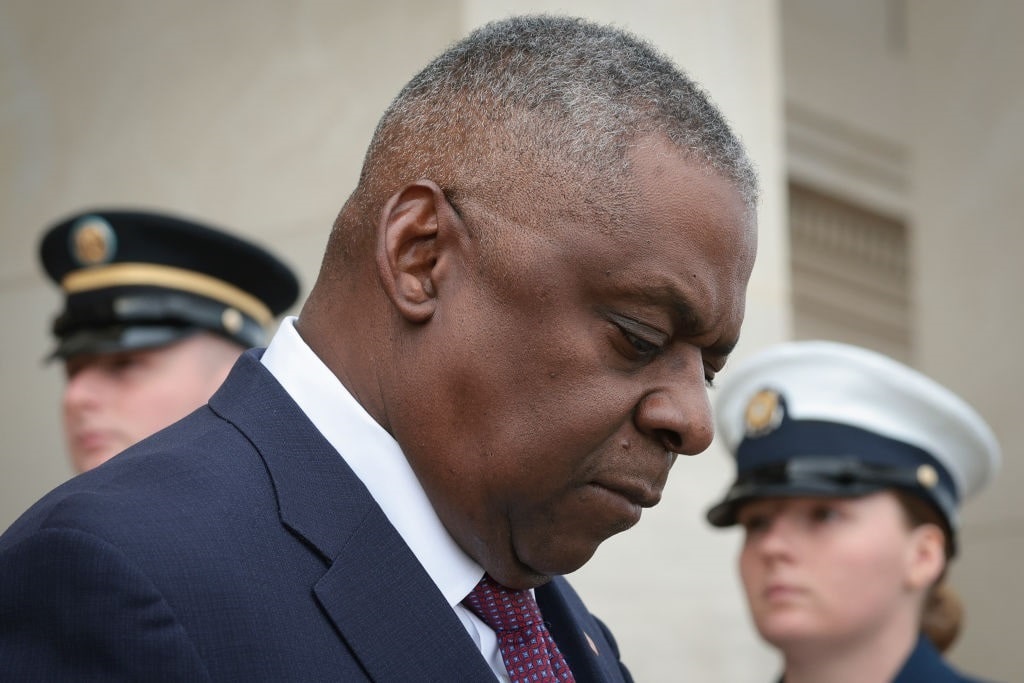The Pentagon was without a resident Defense Secretary for almost a week – and no one knew. According to reports from inside the beltway, the highly unusual situation was made all the more peculiar because Secretary of Defense Lloyd Austin III was in the hospital, and President Biden and the National Security Council didn’t know it for three days. In Washington, DC, if a senior government leader so much as sneezes in a closet, the media alerts the world. But that didn’t happen this time.
Pentagon Target of a New Kind of Criticism

Lloyd Austin (Photo by Win McNamee/Getty Images)
Criticism of President Biden’s Defense Department ranges from chasing after violent extremists where there don’t appear to be any to ill-advised COVID-19 vaccine mandates for the troops to building a hollow but woke armed forces. But withholding critical information about the availability of essential leadership hasn’t been an issue until now.
When one of the key members of the president’s national security team is taken ill, ill enough to be hospitalized for nearly a week, US citizens deserve to know about it. Yet the leader of the US military elected not to inform the people he’s sworn to protect. Austin’s explanation was offered up in a press statement about a week after entering Walter Reed National Military Medical Center. The statement said:
“I am very glad to be on the mend and look forward to returning to the Pentagon soon. I also understand the media concerns about transparency, and I recognize I could have done a better job ensuring the public was appropriately informed. I commit to doing better. But this is important to say: this was my medical procedure, and I take full responsibility for my decisions about disclosure.”
OK, if the secretary takes “full responsibility,” then that makes everything just fine, right? Not so much. Among those most concerned about Austin being hospitalized on New Year’s Day and the Department of Defense public relations flacks not telling anyone until Friday, January 5, was the national media. Generally willing to overlook Biden administration gaffes and bad decisions, the Pentagon press corps was caught by surprise – and they weren’t happy about it. Within hours of the Pentagon finally notifying the press and the public of Austin’s stay in the hospital due to complications from elective surgery, the Pentagon Press Association (PPA) board of directors fired off a stinging letter of rebuke.
The board’s message was unmistakable. It is only reasonable when a cabinet-level government official is under anesthesia or incapacitated that the public has a right to know. “Secretary Austin has no claim to privacy in this situation,” the letter exclaimed. Additionally, the PPA board makes a valid point scolding the Pentagon public affairs leadership, saying:
“At a time when there are growing threats to US military service members in the Middle East and the US is playing key national security roles in the wars in Israel and Ukraine, it is particularly critical for the American public to be informed about the health status and decision-making ability of its top defense leader.”
The Biden national security team decided to assassinate an Iranian-back militia terrorist leader in downtown Baghdad on January 4, presumably while Austin was still in Walter Reed convalescing. Who in the Pentagon made the decision to agree with the president to go ahead with the operation? How was Austin involved, if at all, in directing US Central Command’s operations in the Red Sea? Who was dealing with Iran-sponsored, Yemen-based Houthi terrorists launching missiles and drones at US warships and commercial merchant vessels?
Who’s on First?
Typically, with all hands on deck in the Pentagon’s E-ring, the Secretary of Defense provides the best military advice to the president and authorizes orders sending US troops into harm’s way. When the defense secretary is in the hospital, and no one knows it, who does the advising and authorizing? According to Pentagon Press Secretary US Air Force Major General Patrick Ryder, “At all times, the Deputy Secretary of Defense was prepared to act for and exercise the powers of the Secretary, if required.” But, according to the Associated Press, the Deputy Secretary of Defense was not notified until Thursday (January 4) of Austin’s hospitalization and being in the intensive care unit. Deputy Secretary of Defense Kathleen Hicks was vacationing in Puerto Rico.
Sen. Tom Cotton (R-AR), said Secretary of Defense Lloyd Austin needs to explain why the White House and senior officials weren’t notified that Austin had been hospitalized until days later, at such a crucial time. What smacks of self-serving behavior by Secretary Austin does little to instill confidence in the senior leadership in the Pentagon.
The views expressed are those of the author and not of any other affiliation.




